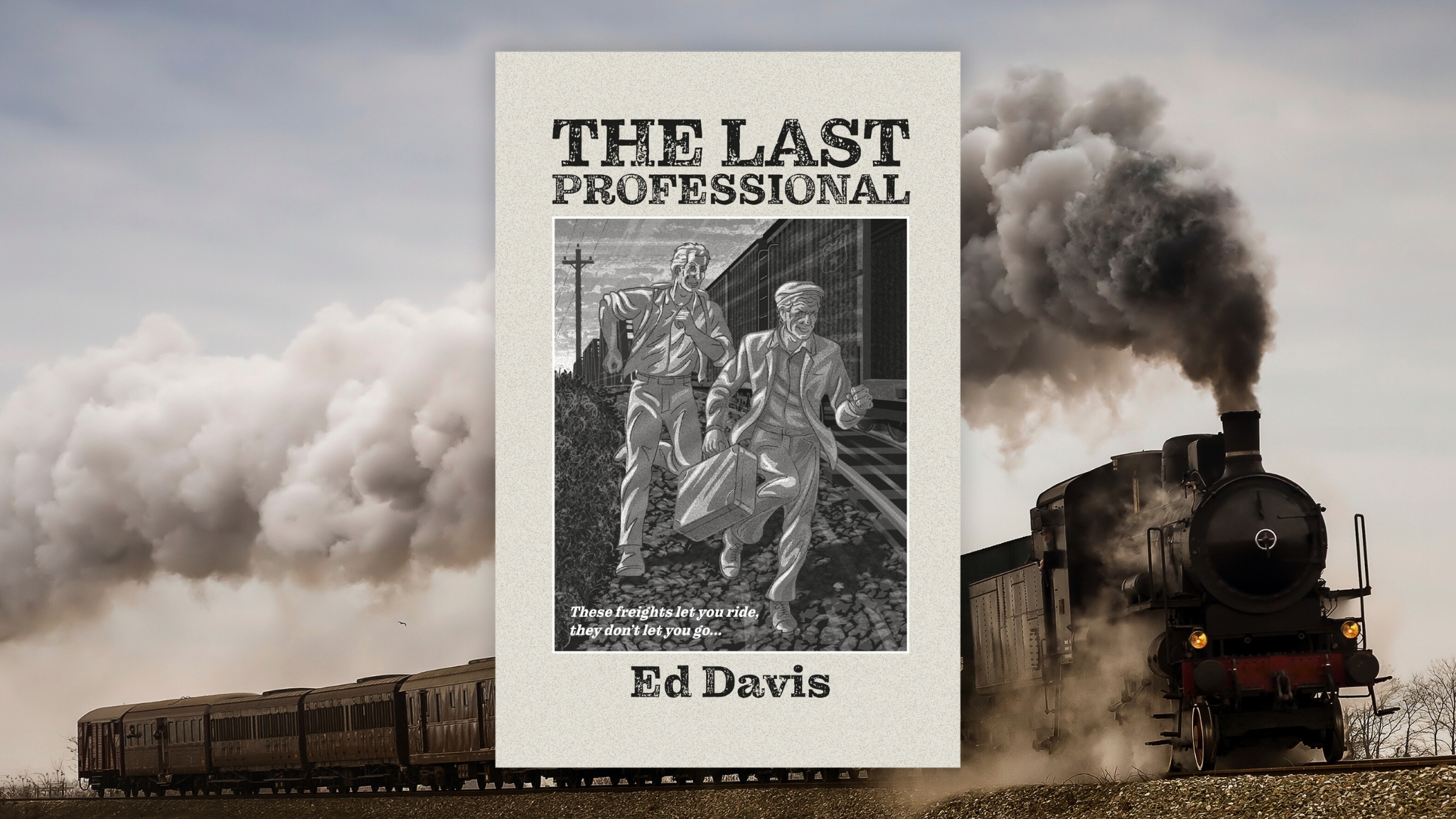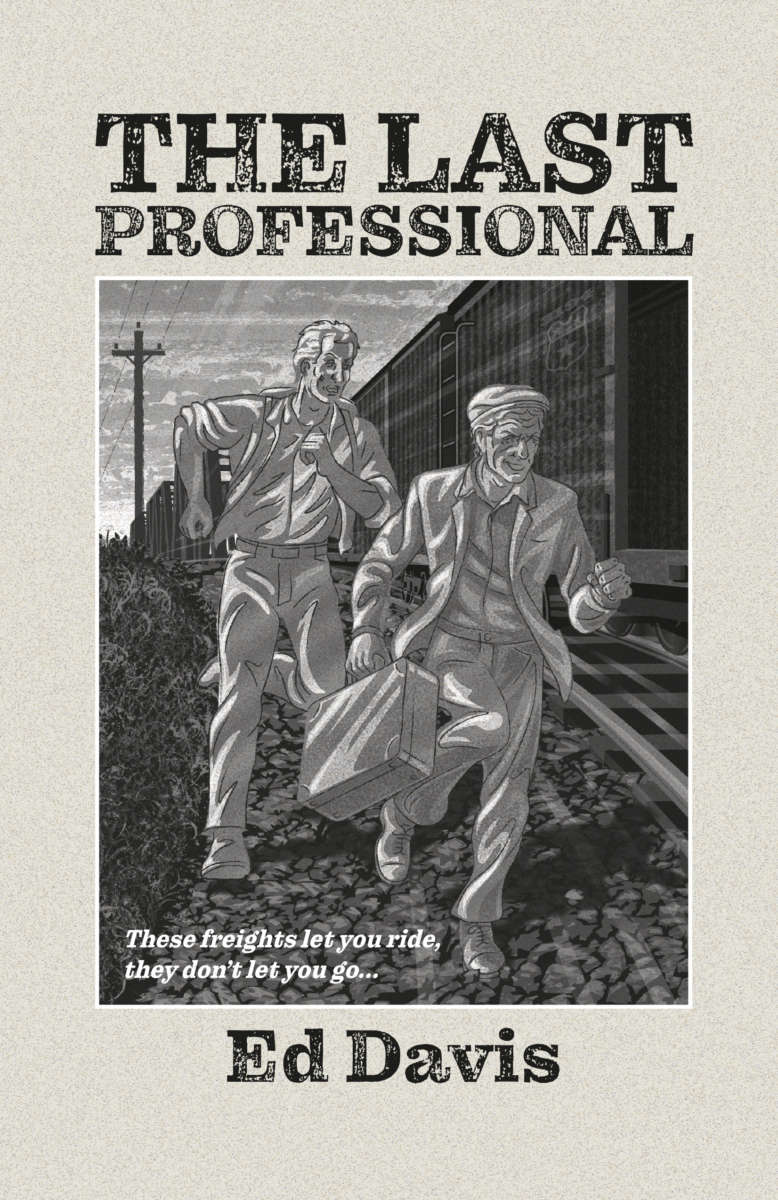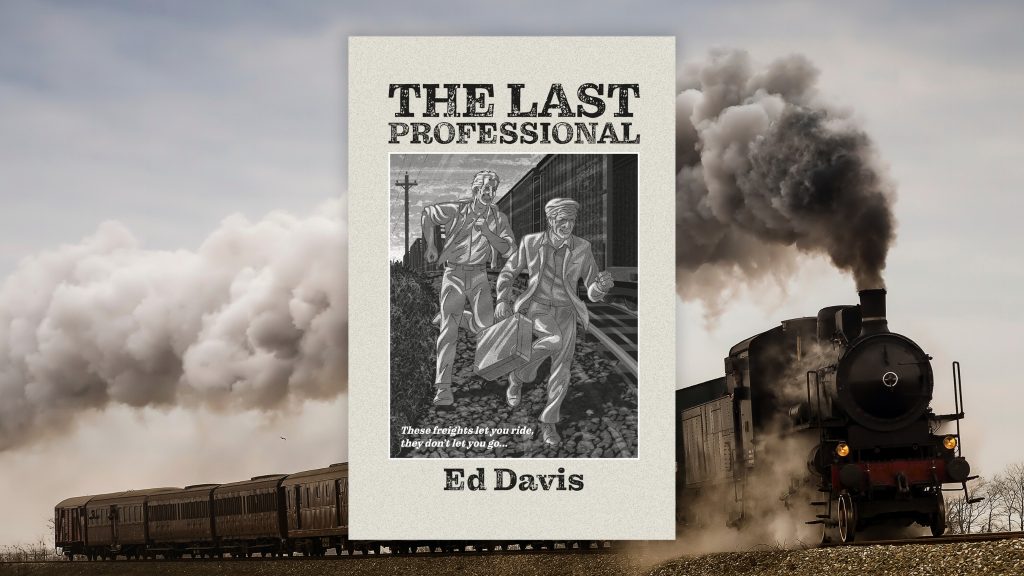
The Last Professional by Ed Davis
Reviews really matter. Sometimes they even put undue pressure on other reviewers — like me.
Before I read The Last Professional by Ed Davis (Artemesia Publishing, LLC), I saw this testimonial about the book from Jerry Cimino, Founder of the Beat Museum in San Francisco: “Davis has done for American railroads what Kerouac did for American highways and Steinbeck did for American nomads.”
Sucked in by that comment, I was more interested to learn how Davis does it, rather than whether in fact he does it at all.
Because the truth is, at least in this reviewer’s opinion, he really does do it, or at least takes a worthy stab. While it’s not likely he will get the acclaim and recognition to stand on a pedestal with those icons, let’s just say it’s not nuts to have the conversation.
And it’s amazing that all this can happen writing about a fraternity of tramps, what Davis calls a “brotherhood of travelers who emerged with the coming of the great iron roads and who held dominion over them for more than a century.” Yet maybe it is precisely the scrutiny given this band of hobos and the slice of America they observe and embrace that makes The Last Professional so powerful.
There’s a story that guides us through. The Duke, one of the last of a breed of so-called “profeshes” (professionals) that live in the boxcars and the “jungle” camps of men near the stations, is running from Short Arm, his former partner and now enemy for which The Duke knows his secrets. Duke rides the rails with Lynden Hoover, a young man who has run away from home in search of a tramp for which the boy has nightmarish memories years ago. That storyline has a dramatic finish.
But the essence of The Last Professional is much greater than that. The rambling trains are a metaphor for an American journey, a frenetic yet serene search for identity. Is it a train to freedom or a train to survival? “I look at the lines in your face,” writes Davis through one character, “and the wear and tear on your body, and the way you choose to live — away from society, away from anybody who might judge you — and I don’t see a man who’s come to peace with his choices, I see a man who is running from them.” Or chosen to run.
Either way, Davis captures the filth, stench, hunger, exhaust, sickness, grit, ingenuity and character of the hobos. And he is not short in grasping their philosophy about life and their existence — in heaps throughout and pointed conversations at the end of each chapter.
He also provides technical information on everything from hopping aboard a boxcar to recognizing friends and foes, to dodging the “bull” security people looking to vanquish the hobos, to negotiating the trains and their schedules. The rules of the rail.
In all this, Davis writes of great beauty in the landscape, in the rush from the heavy breezes to the clanging cars to observe the glorious country before them. His writing elegantly paints the picture: “These pilgrims, who longed for a different path, found that a river of steel had burst to life at their feet. Surging from the midst of the sprawling cities to the smallest hamlets, its tributaries traversed defiant mountain ranges, spanned impossibly vast prairies, and linked the remotest reaches of the country.”
People react to exteriors — tattered clothes, uncleansed bodies, lack of financial means — and rush to judgment without contemplating one’s soul. That’s human nature. But for hobos who appear to have drawn the short sticks in life, is there more to it than that? In glorifying their existence, are they rationalizing their plight or truly showing us that looks aren’t everything?
“There was a tranquility to be had on the surface. The romance of rolling unfettered though the unfurling landscape. The hypnotic magic of motion. The daily discovery of vistas unknown, horizons unseen, life unfiltered. A world only guessed at, and barely comprehended, by those who preferred a roof over their heads to a boxcar floor beneath their feet.”
It’s not so much what Ed Davis has done for American railroads in The Last Professional. It’s what he has done for human awareness, for our conscience, for our understanding of the many paths we take, some by choice and some perhaps outlined in a higher preconceived scheme. Whatever picture your personal perspective presents, perhaps the message is to view life through a wider lens and marvel in the majesty before you, whatever outward stereotypes lead you to believe.
“There’s no secret to it. We’re all of us on a train. It don’t run smooth, it don’t run easy, and it don’t run one minute longer that it’s meant to. You gonna ride it, or let it ride you? That’s the only choice we really get.”
Ed Davis is the author of the novella In All Things, a fictionalized account of his training year as a psychiatric technician at the country’s largest institution for the developmentally disabled. His travel collection, Road Stories, details adventures from skid rows to the Sierras, an African hospital to ancient Inca ruins high in the Andes. His death row thriller, A Matter of Time, was written in real time, in 24 hours, as the last day of the hero’s life unfolds. His work has appeared in Gris-Gris, New English Review, Potato Soup Journal, The Penmen Review, Rougarou and The Umbrella Factory Magazine. A runner, backpacker and master’s level discus thrower, Ed and his wife Jan live in Northern California, not far from Jack London’s Beauty Ranch. Visit www.eddavisbooks.com and Ed Davis’ official YouTube page.

Publish Date: January 25, 2022
Genre: Historical Fiction
Author: Ed Davis
Page Count: 278 pages
Publisher: Artemesia Publishing, LLC
ISBN: 9781951122256

